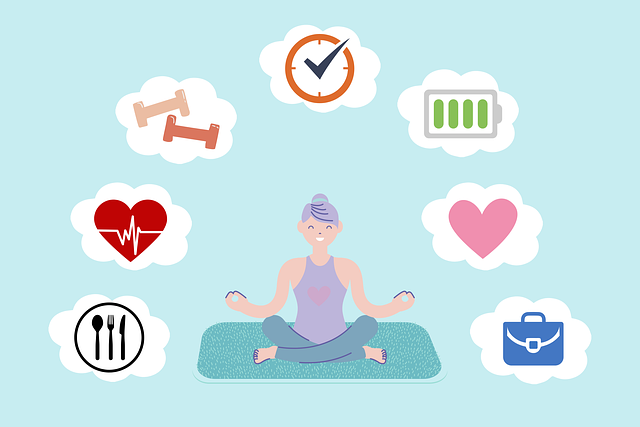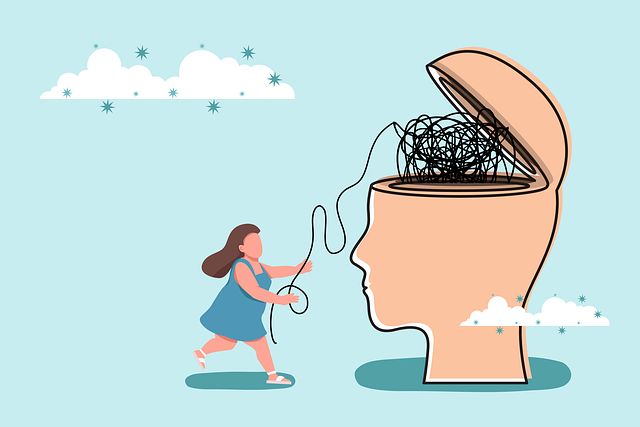Mindfulness meditation, offered by Lone Tree Couples Counseling Therapy, is a powerful tool for emotional regulation and mental wellness. By observing thoughts, emotions, and bodily sensations without judgment, individuals gain clarity and resilience to navigate life's challenges. Creating a dedicated practice space and incorporating mindfulness techniques like breathing exercises, body scans, and mindful walking enhances present-moment awareness and self-awareness, fostering inner peace and overall well-being. Integrating mindfulness into daily life through activities like mindful breathing at work or gratitude practices deepens the practice and improves mental health, supported by programs emphasizing its holistic benefits.
Unwind your mind and embrace tranquility with mindfulness meditation, a powerful tool for mental well-being. This comprehensive guide, tailored by Lone Tree Couples Counseling Therapy experts, will lead you on a journey towards inner peace. From understanding the core principles to setting up a peaceful practice space, we explore essential techniques and provide strategies for integrating mindfulness into your daily routine. Discover how this ancient practice can enhance your life, fostering calmness and clarity.
- Understanding Mindfulness Meditation: A Foundation for Peace
- Setting Up Your Practice Space: Creating a Sacred Haven
- Techniques and Exercises to Cultivate Mindfulness
- Integrating Mindfulness into Daily Life: Sustaining the Practice
Understanding Mindfulness Meditation: A Foundation for Peace

Mindfulness meditation is a practice that cultivates present-moment awareness and non-judgmental acceptance. It involves observing thoughts, emotions, and bodily sensations as they arise, without reacting or getting caught up in them. This simple yet profound act lays a strong foundation for emotional regulation and mental wellness, making it a valuable tool for anyone seeking better mental health, including those who turn to Lone Tree Couples Counseling Therapy.
By regularly engaging in mindfulness meditation, individuals can develop a deeper understanding of their thoughts and emotions, allowing them to navigate life’s challenges with greater clarity and resilience. This practice is not about stopping thoughts or eliminating stress; instead, it empowers individuals to observe and accept their experiences as they are, fostering inner peace and promoting overall mental wellness. Incorporating mindfulness into daily routines can be a game-changer for mental health awareness and well-being, especially when supported by resources like the Mental Wellness Podcast Series Production, which offers guidance and inspiration for cultivating a mindful lifestyle.
Setting Up Your Practice Space: Creating a Sacred Haven

Creating a dedicated practice space is akin to setting the stage for your mindfulness journey. Just as a Lone Tree Couples Counseling Therapy session provides a safe haven for emotional exploration, your personal meditation corner should foster a sense of calm and connection with yourself. Think of it as crafting your own sanctuary—a place where you can retreat from the chaos of daily life, quiet your mind, and nurture your mental wellness.
In designing this space, consider incorporating elements that resonate with you. Perhaps it’s a cozy corner bathed in soft natural light, adorned with plants or crystals that speak to your soul. Or maybe it’s a simple meditation cushion placed before a window, allowing the gentle breeze to carry away stress. The key is to create an environment that supports your Inner Strength Development and enables Conflict Resolution Techniques, making each meditation session a transformative experience available only in your uniquely designed sacred haven.
Techniques and Exercises to Cultivate Mindfulness

Cultivating mindfulness involves a range of techniques and exercises that help individuals become more present and aware in their daily lives. One effective method is focused breathing, where individuals concentrate on inhaling and exhaling, observing the sensation of air filling and leaving their bodies. This simple act anchors them in the present moment, fostering a deeper sense of calm and clarity.
Additionally, body scans and mindful walking are powerful tools for enhancing self-awareness exercises. During a body scan, one slowly brings attention to different parts of the body, noticing any sensations without judgment. This practice allows individuals to connect with their physical selves, releasing tension and promoting relaxation. Mindful walking involves paying close attention to each step, engaging all senses—the feel of feet touching the ground, sounds around, and the movement of the body. These self-care practices, often encouraged by Lone Tree Couples Counseling Therapy, not only improve mindfulness but also foster compassion cultivation practices, ultimately leading to better mental health and well-being.
Integrating Mindfulness into Daily Life: Sustaining the Practice

Integrating mindfulness into daily life is a key aspect of sustaining this beneficial practice. It’s about more than just setting aside a few minutes each day for meditation; it’s about cultivating a mindset that embraces presence and awareness throughout every moment. Lone Tree Couples Counseling Therapy encourages clients to explore various ways to incorporate mindfulness, such as mindful breathing exercises during breaks at work or engaging in compassion cultivation practices while running errands.
By weaving mindfulness into everyday activities, individuals can deepen their practice and reap its long-lasting benefits for mental health. This could mean paying close attention to sensory experiences during a walk in nature, practicing gratitude by reflecting on positive moments at the end of each day, or even engaging in mindful eating to savor every bite. These small, consistent actions contribute to a thriving mind and can be supported through participation in Mental Health Education Programs Design that emphasize mindfulness as a cornerstone of holistic well-being.
Mindfulness meditation, as explored through this guide, offers a path towards inner peace and enhanced well-being. By establishing a dedicated practice space and employing various techniques, individuals can cultivate mindfulness in their daily lives. Lone Tree Couples Counseling Therapy emphasizes the transformative power of these practices, encouraging readers to embrace mindfulness as a sustainable tool for managing stress and improving mental clarity. Integrating mindfulness into routine activities allows one to stay present and appreciate life’s moments, fostering a deeper connection with oneself and others.














